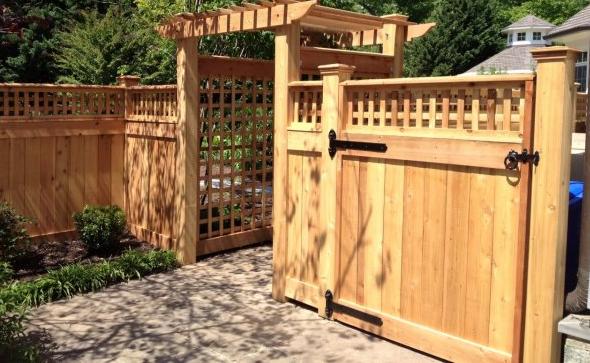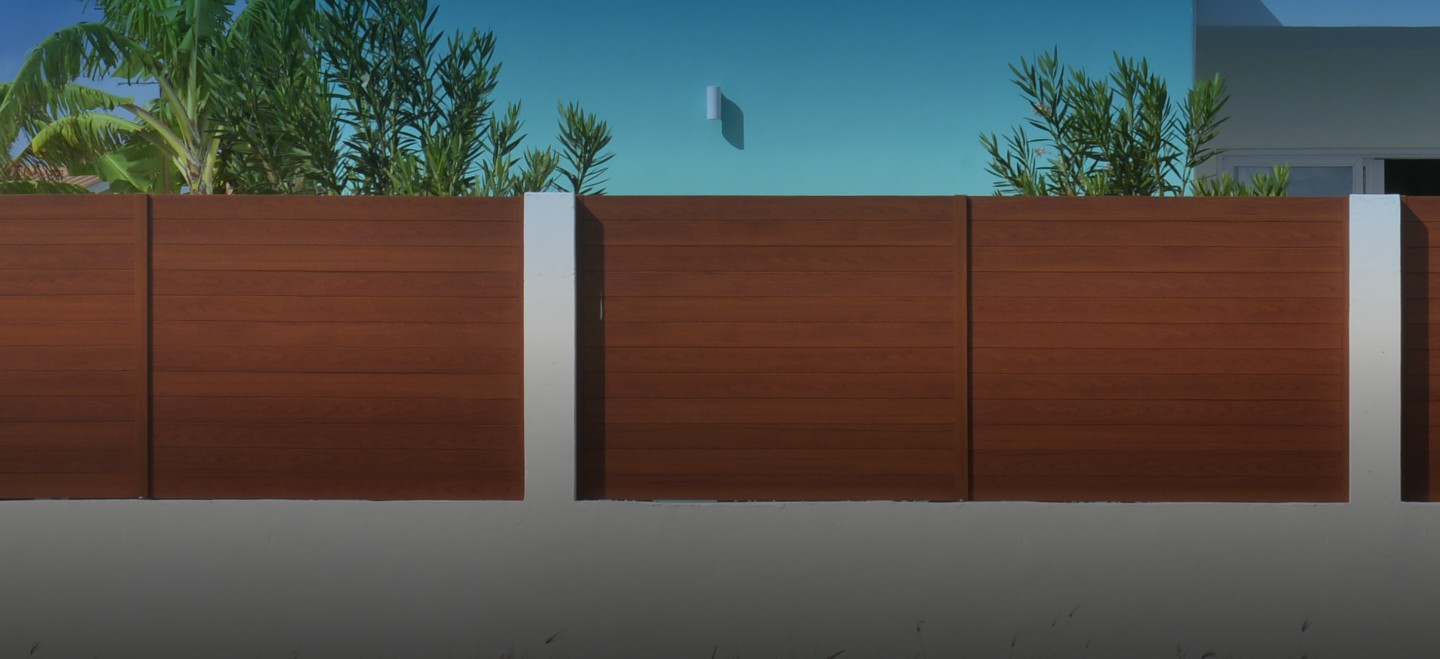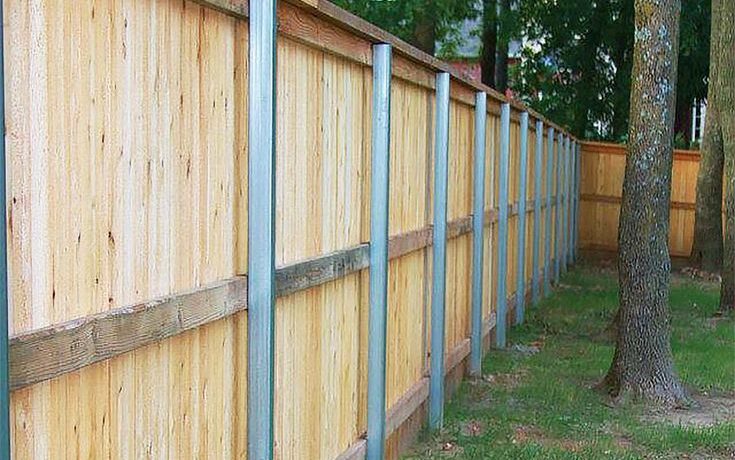All Categories
Featured
When picking a fencing for your building, it's important to consider elements like price, longevity, maintenance, and aesthetic charm. 3 of the most preferred products for household and business fencings are aluminum, vinyl, and timber. Each offers distinct advantages and some disadvantages, making it essential to review your needs before choosing. Listed below, we contrast the advantages and disadvantages of these products to assist direct your selection.
Timber Secure Fencing. Pros:
![]()
All-natural Visual: Timber fences are understood for their timeless, natural look. They can easily mix into many landscapes and boost the beauty of your home or organization. Whether you're going for a rustic appearance or a much more sleek coating, wood can be personalized with paint, stain, or sealant. Modification: Timber is just one of one of the most functional products, enabling for a wide array of styles, such as picket fences, privacy fencings, and ranch-style rooms. It's simple to readjust the design to fit the specific demands of your property. Cost effective: Normally, wood fencings come at a lower initial cost contrasted to plastic or light weight aluminum, making them a cost-effective option for those on a budget plan. Disadvantages:
Maintenance Requirements: Timber fencings need regular maintenance to maintain their beauty and capability. This includes discoloration or paint to shield against rot, termites, and climate damages. Without correct care, wood can degrade gradually. Much Shorter Lifespan: Contrasted to plastic or aluminum, timber fences tend to have a shorter life expectancy, particularly in areas with extreme weather condition. Harsh problems, such as hefty rain, humidity, or snow, can trigger wood to deteriorate faster. Prone to Damages: Wood fences are vulnerable to harm from pests, consisting of termites, as well as all-natural wear from climate. They may additionally warp or fracture otherwise appropriately kept. Plastic Fence. Pros:
Low Upkeep: One of the major advantages of plastic fences is that they call for minimal upkeep. Unlike wood, vinyl doesn't need to be painted, secured, or discolored. It's resistant to fading, staining, and cracking, which saves time and money on maintenance. Toughness: Plastic is understood for its capability to endure severe weather without wearing away. It's resistant to bugs like termites, and its resistance to dampness and UV rays ensures it remains looking helpful for years. Resilient: A vinyl fencing can last as much as thirty years or more, making it a great long-lasting financial investment. Several makers provide warranties, further boosting its value. Selection of Styles: Vinyl fencings are readily available in various shades and designs, including those that mimic wood. You can pick from privacy, picket, or attractive styles, giving versatility to match your home or business. Cons:
![]()
Greater Upfront Price: Vinyl fencings often tend to have a greater initial expense than wood. While the long-lasting cost savings on upkeep are substantial, the upfront financial investment might be a deterrent for some property owners. Limited Customization: Plastic fences can be found in common layouts, and while colors and designs are diverse, you may not have as much flexibility for modification compared to wood. Cracking in Cold Climates: While plastic is sturdy, in incredibly cool climates, it can come to be breakable and split upon effect, which can be bothersome in areas with extreme wintertimes. Light weight aluminum Fence. Pros:
Low Maintenance: Aluminum fencings are understood for their low-maintenance demands. Unlike wood, aluminum does not rust or corrode, and it does not need to be repainted or sealed. This makes it a terrific choice for those who want an easy option. Toughness and Stamina: Aluminum is a robust product that stands up well to extreme weather. It's an exceptional choice for seaside areas where deep sea corrosion is a concern, as it's resistant to rust. Aesthetic Charm: Aluminum fencings supply a clean, stylish appearance, typically made use of for attractive functions. They're readily available in different styles, including ornamental layouts, and can include a high-end feel to your property. Security: Aluminum fencings are durable and deal excellent protection, specifically when mounted with locks or entrances. Their strong construction supplies a trusted obstacle against undesirable entrance. Cons:
![]()
Greater Preliminary Price: Aluminum fences have a tendency to be extra pricey than timber, particularly if you choose decorative styles. The in advance expense may be prohibitive for some. Much Less Privacy: Aluminum fences generally have wider gaps between the slats, which means they provide much less privacy than timber or vinyl fences. Aluminum might not be the finest option if seclusion is a top priority. Denting Issues: While light weight aluminum is rust-resistant, it is vulnerable to nicking or bending if struck with pressure. A car crash or heavy effect can trigger long-term damage to the fencing. Which Fence Product is Right for You? Choosing the right fencing depends on numerous factors, including your spending plan, style preferences, maintenance capacity, and the atmosphere in which you live. If you desire an all-natural look and are prepared for routine upkeep, timber might be the right choice.
Ultimately, each fencing product has its benefits and drawbacks, so it is essential to assess what matters most for your details needs. Take into consideration the environment, the degree of personal privacy you call for, and exactly how much maintenance you're prepared to devote to, and you'll discover the ideal fence for your home.
Timber Secure Fencing. Pros:

All-natural Visual: Timber fences are understood for their timeless, natural look. They can easily mix into many landscapes and boost the beauty of your home or organization. Whether you're going for a rustic appearance or a much more sleek coating, wood can be personalized with paint, stain, or sealant. Modification: Timber is just one of one of the most functional products, enabling for a wide array of styles, such as picket fences, privacy fencings, and ranch-style rooms. It's simple to readjust the design to fit the specific demands of your property. Cost effective: Normally, wood fencings come at a lower initial cost contrasted to plastic or light weight aluminum, making them a cost-effective option for those on a budget plan. Disadvantages:
Maintenance Requirements: Timber fencings need regular maintenance to maintain their beauty and capability. This includes discoloration or paint to shield against rot, termites, and climate damages. Without correct care, wood can degrade gradually. Much Shorter Lifespan: Contrasted to plastic or aluminum, timber fences tend to have a shorter life expectancy, particularly in areas with extreme weather condition. Harsh problems, such as hefty rain, humidity, or snow, can trigger wood to deteriorate faster. Prone to Damages: Wood fences are vulnerable to harm from pests, consisting of termites, as well as all-natural wear from climate. They may additionally warp or fracture otherwise appropriately kept. Plastic Fence. Pros:
Low Upkeep: One of the major advantages of plastic fences is that they call for minimal upkeep. Unlike wood, vinyl doesn't need to be painted, secured, or discolored. It's resistant to fading, staining, and cracking, which saves time and money on maintenance. Toughness: Plastic is understood for its capability to endure severe weather without wearing away. It's resistant to bugs like termites, and its resistance to dampness and UV rays ensures it remains looking helpful for years. Resilient: A vinyl fencing can last as much as thirty years or more, making it a great long-lasting financial investment. Several makers provide warranties, further boosting its value. Selection of Styles: Vinyl fencings are readily available in various shades and designs, including those that mimic wood. You can pick from privacy, picket, or attractive styles, giving versatility to match your home or business. Cons:

Greater Upfront Price: Vinyl fencings often tend to have a greater initial expense than wood. While the long-lasting cost savings on upkeep are substantial, the upfront financial investment might be a deterrent for some property owners. Limited Customization: Plastic fences can be found in common layouts, and while colors and designs are diverse, you may not have as much flexibility for modification compared to wood. Cracking in Cold Climates: While plastic is sturdy, in incredibly cool climates, it can come to be breakable and split upon effect, which can be bothersome in areas with extreme wintertimes. Light weight aluminum Fence. Pros:
Low Maintenance: Aluminum fencings are understood for their low-maintenance demands. Unlike wood, aluminum does not rust or corrode, and it does not need to be repainted or sealed. This makes it a terrific choice for those who want an easy option. Toughness and Stamina: Aluminum is a robust product that stands up well to extreme weather. It's an exceptional choice for seaside areas where deep sea corrosion is a concern, as it's resistant to rust. Aesthetic Charm: Aluminum fencings supply a clean, stylish appearance, typically made use of for attractive functions. They're readily available in different styles, including ornamental layouts, and can include a high-end feel to your property. Security: Aluminum fencings are durable and deal excellent protection, specifically when mounted with locks or entrances. Their strong construction supplies a trusted obstacle against undesirable entrance. Cons:

Greater Preliminary Price: Aluminum fences have a tendency to be extra pricey than timber, particularly if you choose decorative styles. The in advance expense may be prohibitive for some. Much Less Privacy: Aluminum fences generally have wider gaps between the slats, which means they provide much less privacy than timber or vinyl fences. Aluminum might not be the finest option if seclusion is a top priority. Denting Issues: While light weight aluminum is rust-resistant, it is vulnerable to nicking or bending if struck with pressure. A car crash or heavy effect can trigger long-term damage to the fencing. Which Fence Product is Right for You? Choosing the right fencing depends on numerous factors, including your spending plan, style preferences, maintenance capacity, and the atmosphere in which you live. If you desire an all-natural look and are prepared for routine upkeep, timber might be the right choice.
Ultimately, each fencing product has its benefits and drawbacks, so it is essential to assess what matters most for your details needs. Take into consideration the environment, the degree of personal privacy you call for, and exactly how much maintenance you're prepared to devote to, and you'll discover the ideal fence for your home.
Latest Posts
Check Out the Best Auto Repair Discounts in Montclare, Chicago
Published May 27, 25
1 min read
Why Chicago Drivers Select Montclare Auto Repair for Reliable Service and Significant Savings
Published May 26, 25
1 min read
Find Out How WyHy Federal Credit Union Saves You Money on Loans and Savings
Published May 25, 25
1 min read
More
Latest Posts
Check Out the Best Auto Repair Discounts in Montclare, Chicago
Published May 27, 25
1 min read
Why Chicago Drivers Select Montclare Auto Repair for Reliable Service and Significant Savings
Published May 26, 25
1 min read
Find Out How WyHy Federal Credit Union Saves You Money on Loans and Savings
Published May 25, 25
1 min read